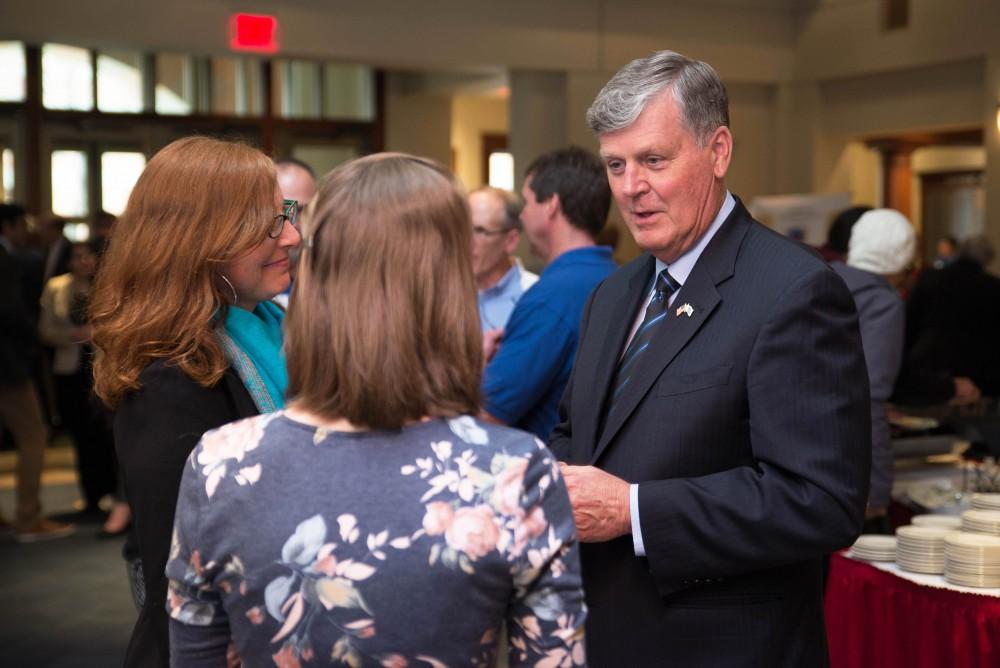Fighting for funds: University officials travel to Lansing to make case for increased state backing

GVL / Luke Holmes – President Haas speaks with a student about the project she runs.The Civic Engagement Showcase was held in the DeVos Center in downtown Grand Rapids on Thursday, April 13, 2017.
Mar 12, 2018
Before students left Allendale to celebrate spring break, two university officials spoke in front of Michigan representatives for an increase in state funding.
On Thursday, March 1, Grand Valley State University President Thomas Haas, as well as GVSU student senate president Jonathan Bowman and student senators Cameron Jones and Julian VanDaele, traveled to the Michigan State Capitol in Lansing to discuss an increase in GVSU’s state-allocated funds.
Seeing an increase in funding for GVSU has been a priority for Haas. In his retirement announcement Wednesday, Feb. 28, he spoke of the necessity for more resources put into the university.
“We cannot tolerate any further disinvestment in higher education,” Haas said. “Education is a public good, and states that invest in it have more lively economies and communities.”
Multiple universities were present at the event. However, Bowman was the only student representative to speak.
“I think the fact that I am in front of you today shows the student-centered attitude of Grand Valley, an attitude which all universities should have,” he said in his statement. “Representing Grand Valley’s 25,000 students, I want to share how impactful our college experience has been. Grand Valley is preparing future nurses, engineers, teachers and people in many other fields who will be the driving force for the innovation and development of our great state.
“We need the state to invest more into our education and for higher education to be seen as a priority.”
Throughout the 2017-18 academic year, both university administration and student senate have made an effort to draw attention to GVSU’s comparative lack of funding. In January, senate collaborated with other schools in Michigan to create a petition geared toward state funding.
The 11th annual Accountability Report, released in November, showed that GVSU has received the second-lowest funding per student for the past five years.
According to university officials, an increase in state funding could result in lower tuition costs for GVSU students. In Haas’ nearly 12 years at the university, he has made a concerted effort to alleviate financial concerns on the behalf of students.
“I think it’s clearly evident when you look at the Grand Finish Grant that President Haas started; it gives (a) $1,000 grant for all fourth-year seniors. I think that really shows (his dedication),” Bowman said. “That was something that he asked the legislature: If you give us increased funding, we’re going to give that directly back to students.”
Other senate efforts include alerting Michigan gubernatorial candidates to GVSU’s comparative lack of funding. Jones, a member of the external relations committee of student senate, reached out to multiple candidates on the issue.
Jones sent a statement to candidates Bill Schuette, Brian Calley, Gretchen Whitmer and Abdul El-Sayed. The statement detailed GVSU’s impact on Michigan’s economy, as well as other key issues related to higher education funding. Jones also attached a copy of the Accountability Report with the statement.
Part of his statement reads as follows:
The state of Michigan considers Grand Valley at the bottom of funding decisions despite the university’s performance at the top. Our growth in the last twenty years has not been accompanied by an equivalent increase in funding, meaning that Grand Valley’s students are simultaneously some of the best-performing and some of the most underserved in the state. We run an incredibly efficient program at GVSU that attracts talented students who graduate here and who stay to work in Michigan, and we believe that those students deserve investment from the state of Michigan that matches their achievement.
I am reaching out to you as a candidate for Michigan’s next governor to inquire about your position on higher education funding. More money from the state of Michigan would allow Grand Valley to improve our technological infrastructure, to provide our growing population of students with adequate facilities and with qualified faculty, and to expand our leadership development programs so that our brightest students have every opportunity to achieve their full potential.
Of the candidates Jones reached out to, only El-Sayed responded. His team gave Jones the following response:
We will build a higher education system that supports both college and vocational education. Our higher education system must prepare our youth to thrive—no matter what path they choose while eliminating barriers to social mobility. That means we will work to make college tuition-free for families earning less than $150,000 annually—and much more affordable for all families—through creating a universal state grant for Michigan students. We will also provide additional financial support to adult and non-traditional students enrolled in any form of postsecondary education, including vocational training and apprenticeships. Furthermore, we plan to partner with community colleges, unions, and employers to expand accredited training opportunities that combine the best of the traditional college model with the best of the apprenticeship model.
El-Sayed will participate in a town hall at GVSU on Wednesday, March 14, from 5 p.m. to 6 p.m. in the Kirkhof Center Grand River Room. In addition to funding for higher education, El-Sayed will also discuss housing reform and marijuana legalization.
As for GVSU, Bowman and others hope that the university and its students are recognized for their continued performance.
“The cost of attending college is increasing, and there is more of a burden on (students),” Bowman said. “I think that’s something that we need to advocate for. If it was based on performance, which schools are performing the best, Grand Valley would be a lot higher.”






















